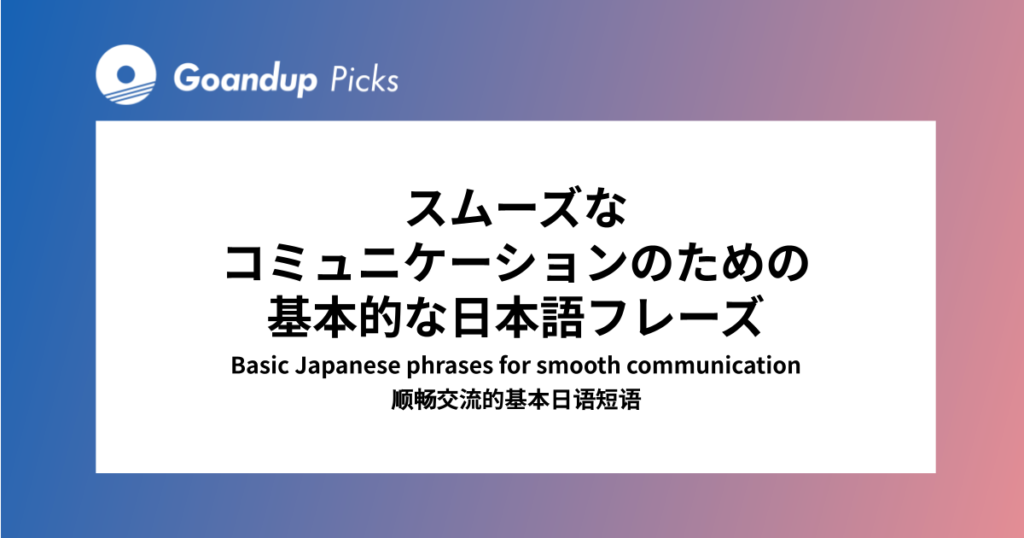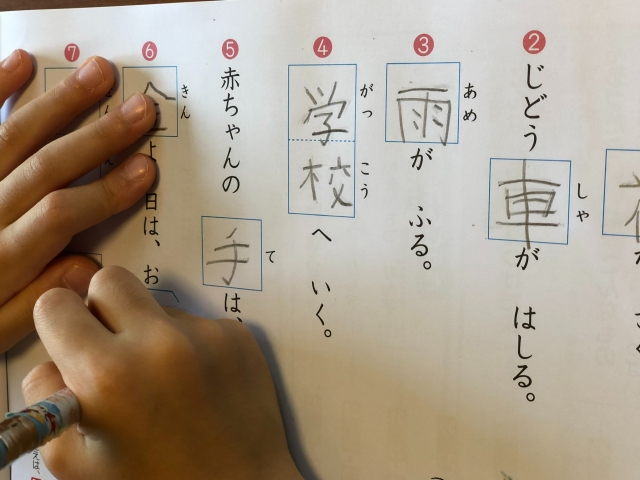Basic Japanese phrases for smooth communication

日本語を学習する方にとって日本語を学習する際にはあまりに多くの種類の表現を学習するので、混乱することも多いと思います。
この記事では、そんなお悩みをお持ちの日本語を勉強されている人に、知っておいて欲しい最低限の基本フレーズと、覚えておいて欲しい表現をまとめました。
▼Goandup Picks Click here for recommended articles!
- Required before studying abroad! Goandup Nihongo+, an online Japanese language learning service
- This page introduces services for foreigners who wish to study in Japan or improve their Japanese language skills to learn Japanese online.
- Goandup Salon" community for foreigners living in Japan
- We introduce an online community where foreigners living in Japan can exchange information and interact with each other to support their life in Japan.
- Goandup Study" supports foreigners who want to study in Japan.
- This section introduces study abroad support services that provide comprehensive support to foreigners who wish to study in Japan, from preparation for study abroad to living in Japan.
- Where can I buy a prepaid SIM in Japan? Recommended SIM cards for foreigners are also introduced.
- How to purchase a prepaid SIM and suitable SIM cards for foreigners.
- The Complete Guide to Pocket Wi-Fi in Japan for Foreigners!
- We introduce how to select and recommend pocket Wi-Fi products that can be used conveniently in Japan.
- The Complete Guide to Finding a Job in Japan! Finding a job, changing jobs, and part-time work for foreigners
- This site provides foreigners who want to work in Japan with comprehensive information on how to find a job, recommended job sites, and other information necessary to find a job.
日常生活での日本語フレーズ

あいさつの基本
日々のあいさつは、それぞれの時間帯に応じたあいさつをすることで、日常のコミュニケーションが円滑に行われます。
- おはようございます (Ohayou gozaimasu)
- 朝に使う挨拶です。
- 朝に使う挨拶です。
- こんにちは (Kon nichiwa)
- 日中に使います。
- 日中に使います。
- こんばんは (Konbanwa)
- 夜に使います。
これらのあいさつは、相手への基本的な敬意を表し、日々の交流に役立っています。
感謝の表現
「ありがとうございます」は、形式ばった状況や上司など、尊敬を表す必要がある相手に向けて使います。対照的に、「ありがとう」はよりカジュアルな環境や友人間での会話に適しています。どちらも感謝を表すために用いられます。
何かをしてもらった時には、心からの感謝を伝えましょう。
- ありがとうございます (Arigatou gozaimasu)
- 正式な場での感謝の言葉です。
- 正式な場での感謝の言葉です。
- ありがとう (Arigatou)
- もっと親しい関係で使います。
返事の基本
返事は、自分の意思を相手に伝える際にとても大切です。
例えば、「はい」と一言答えることで、何かに同意していることや、何かを肯定していることを示すことができます。「いいえ」と答えると、何かに反対していることや、何かを否定していることを相手にはっきりと伝えることができます。単純な言葉ですが、日常会話の中で意見や感情を明確にし、相手との理解を深めるためには必ず使用する言葉です。
肯定も否定も、はっきりと伝えることが大切です。
- はい(Hai)
- 肯定の返事に使います。
- 肯定の返事に使います。
- いいえ(Iie)
- 否定の返事に使います。
謝罪とお願い
「すみません」という言葉は日常の多くの場面で役立ちます。間違いを認める時や、誰かに頼み事をする時にこの言葉を使うことで、お詫びの気持ちや敬意を表現できます。簡単でありながらはっきりと意思を伝えることができるこのフレーズは、誤解を避けたり、スムーズな人間関係を築くためにとても大切です。
- すみません (Sumimasen)
- 「Excuse me」に相当し、謝罪やお願いをするときに使います。
旅行中の便利なフレーズ

旅行は新しい体験がたくさんあって、本当に楽しいものですが、時には見慣れない場所で道に迷ったり、レストランなどでどう注文すれば分からない時もあります。
そんな時に備えて、役立つ便利な言葉をいくつか覚えておくと安心です。これからご紹介するフレーズは、そうした状況でうまくコミュニケーションするのにとても役立ちますので是非、覚えておきましょう。
道を尋ねるとき
- すみません、○○はどこですか?(Sumimasen, ○○ wa doko desu ka?)
- 場所を尋ねるときに使います。
- 場所を尋ねるときに使います。
- ○○への道を教えていただけますか?(○○ e no michi o oshiete itadakemasu ka?)
- 方向を知りたい時に使います。
レストランに行った時
- メニューを見せていただけますか?(Menyuu o misete itadakemasu ka?)
- メニューをもらいたい時に使います。
- メニューをもらいたい時に使います。
- これを注文します。(Kore o chuumon shimasu)
- 料理を注文する時に使います。
※メニューに使われている日本語が難しく、言葉が読めない時は、写真を指差すだけで大丈夫です。
- 料理を注文する時に使います。
- お会計をお願いします。(Okaikei o onegaishimasu)
- 支払いを請求する時に使います。
ショッピングをしている時
- これはいくらですか? (Kore wa ikura desuka?)
- 金額を知りたい時に使います。
- 金額を知りたい時に使います。
- これを試着してもいいですか? (Kore o shichaku shitemo iidesuka?)
- 試着をしたい時に使います。
- 試着をしたい時に使います。
- これを買います。(Kore o kaimasu)
- 購入したい時に使います。
職場でのコミュニケーション

職場での適切なコミュニケーションは、仕事の効率だけでなく、職場内の信頼関係を築く上でも非常に大切です。そこで役立つ、基本的な日本語のビジネスフレーズをご紹介します。
これらは、日々の業務での挨拶や、ミーティングでの意見交換、丁寧なメールのやり取りなど、職場での様々なシーンで使える便利な表現です。
挨拶や日常のやり取りで
- 「おはようございます(Ohayou gozaimasu)」
- 朝、出勤したときに使う挨拶です。
- 朝、出勤したときに使う挨拶です。
- 「いってきます(Ittekimasu)」
- 自分が職場を離れる時に使う言葉です。
- 自分が職場を離れる時に使う言葉です。
- 「いってらっしゃい(Itterasshai)」
- 他の人が職場を離れる時に使う挨拶です。
- 他の人が職場を離れる時に使う挨拶です。
- 「お疲れ様です(Otsukaresama desu)」
- 仕事で自分が帰る時や、帰ろうとする同僚に声をかける時に使います。
ミーティングでの意見交換で
- 「私の見解では…です(Watashi no kenkai dewa… desu)」
- 自分の意見や考えを述べるときに使います。
- 自分の意見や考えを述べるときに使います。
- 「私の提案は…です(Watashi no teian wa… desu)」
- ミーティングで何かを提案する時に使う表現です。
- ミーティングで何かを提案する時に使う表現です。
- 「それについて、どう思いますか?(Sore ni tsuite, dou omoimasu ka?)」
- 他の人の意見を求める時に使うフレーズです。
丁寧なメールのやり取りで
- 「ご返信ありがとうございます(Go henshin arigatou gozaimasu)」
- メールで返信をもらった時に使う表現です。
- メールで返信をもらった時に使う表現です。
- 「○○様、お世話になっております。(○○sama,Osewa ni natte orimasu)」
- 丁寧なメールの書き出しをしたい時に使います。お世話になっております。という文が無くてもメールの内容としては問題ありませんが、より丁寧な表現として好まれています。
- 丁寧なメールの書き出しをしたい時に使います。お世話になっております。という文が無くてもメールの内容としては問題ありませんが、より丁寧な表現として好まれています。
- 「引き続き、よろしくお願いいたします(Hikitsuzuki, yoroshiku onegai itashimasu)」
- メールの結びで、今後とも良い関係を維持したい時に使います。
- メールの結びで、今後とも良い関係を維持したい時に使います。
これらのフレーズは、職場での信頼関係を築きながら、スムーズで効率的なコミュニケーションを実現するために有効です。常に相手を尊重し、礼儀を持って使用することが大切です。
“やさしい”日本語

「やさしい日本語」とは、日本語学習者や日本で生活する外国人が理解しやすいように、難しい表現を避け、簡単でわかりやすい言葉を使って話すまたは書く日本語のことです。
その特徴には以下のようなものがあります。
- 基本的な語彙の使用
- 難しい専門用語や漢字の多用を避け、基本的な単語を使います。
- 難しい専門用語や漢字の多用を避け、基本的な単語を使います。
- 簡潔な文法構造
- 複雑な文法を避け、シンプルで明確な文構造を心がけます。
- 複雑な文法を避け、シンプルで明確な文構造を心がけます。
- 短い文
- 長い文よりも短く、簡潔な文を使って意味を明確にします。
- 長い文よりも短く、簡潔な文を使って意味を明確にします。
- 漢字の使用を控える
- 漢字を使う場合は、ふりがなを付けるか、簡単なものに限ります。
- 漢字を使う場合は、ふりがなを付けるか、簡単なものに限ります。
- 直接的な表現
- 間接的や比喩的な表現を避け、直接的で具体的な言い方をします。
- 間接的や比喩的な表現を避け、直接的で具体的な言い方をします。
- 親しみやすい言葉選び
- 敬語の過度な使用を避け、親しみやすい表現を使います。
日常生活で使う単語
日々の会話において、よく使われる言葉をもっとシンプルにしてみましょう。
「こんにちは(konnichiwa)」,「ありがとう(arigatou)」はそのままです。
「すみません(sumimasen)」は、よりカジュアルな「ごめんなさい(gomen nasai)」に置き換えることができます。
職場での用語
専門用語やビジネスでの複雑な表現も、「やさしい日本語」を使って、より直接的で分かりやすく変えることができます。
「雇用契約」school (e.g. of ikebana)「しごとのきまり(shigoto no kimari)」,「業務委託」school (e.g. of ikebana)「ほかの人にしごとをお願いすること(hoka no hito ni shigoto o onegai suru koto)」,「給与明細」school (e.g. of ikebana)「給料のせつめいしょ(kyuuryou no setsumeisho)」に変わります。
方向や場所に関する表現
移動や場所の説明においても、分かりやすい言葉を選ぶことで、誰にとっても理解しやすい案内が可能になります。
「○○はどこですか?」school (e.g. of ikebana)「○○はどこ?(○○ wa doko?)」と短くなります。
「左折」school (e.g. of ikebana)「ひだりにまがる(hidari ni magaru)」,
「右折」school (e.g. of ikebana)「みぎにまがる(migi ni magaru)」と言い換えられます。
感情や体調を示す表現
感情や体調を伝える際も、直感的に理解しやすい表現を選ぶことで、もっと自然に感覚を共有できます。
「疲れました」school (e.g. of ikebana)「つかれた(tsukareta)」,
「心配です」school (e.g. of ikebana)「しんぱい(shinpai)」,
「楽しい」はそのまま「たのしい(tanoshii)」と表現されます。
「やさしい日本語」は、日本語を母国語としない人だけでなく、様々な背景の人々との明瞭なコミュニケーションしやすくなります。
まずは、この「やさしい日本語」だけでも使えるようになりましょう。
summary
いかがだったでしょうか?日本語の初心者が日本での生活においてよく使うフレーズを簡単に学べるような表現ばっかりだったと思います。
日本語は、特殊な表現や、敬語の種類が多く、心が折れそうになるでしょう。しかし、日々のあいさつや、感謝を示す言葉、簡単な返事、そして謝罪やお願いのフレーズさえ押さえておけば、日本でのコミュニケーションは可能です。特に、日常的な表現を簡単にする「やさしい日本語」は、日本語を勉強する初心者向けの表現が多いので、まずはそこから学んでみるのも良いでしょう。
この記事を参考にして、日本語でのコミュニケーションに自信を持って楽しむきっかけにしていただけたら嬉しいです。






